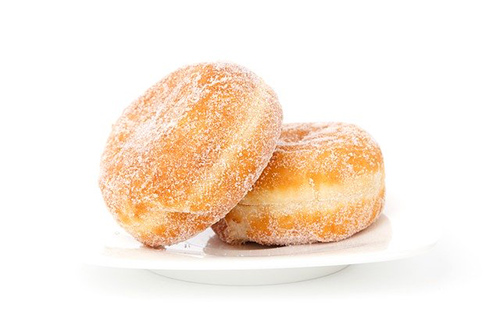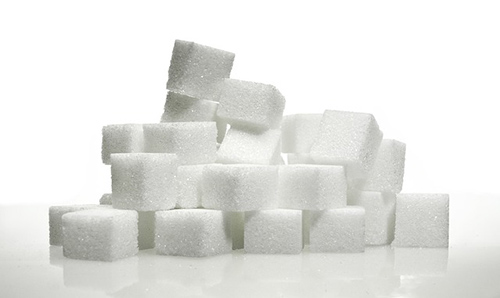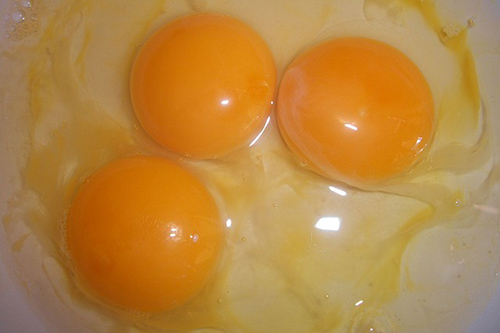
CHOLESTEROL: First on the list of foods that clog arteries. The development of heart disease requires a certain amount of cholesterol in the blood. However, this is not sufficient by itself. Other factors, such as a lack of vegetable antioxidants, tobacco use, or hypertension, cause cholesterol deposits on artery walls.
SATURATED FAT: These promote cholesterol production within the body and its deposit on the arterial walls. Because of this, saturated fat is one of the main foods that clog arteries.
TRANS FATTY ACIDS: Although these come from healthful vegetable oils, they promote heart disease, just as do saturated fatty acids. They are found primarily in margarine, industrial baked goods, and fried foods.

WHITE SUGAR: Sugar increases blood triglyceride levels, which promotes heart issues. However, the harmful effects of sugar are due primarily to other ingredients used with it. Refined flour, trans fatty acids, and saturated fatty acids contribute to high blood pressure and coronary disease and are used in sweet rolls, pastries, and other sweets.
SALT: Sodium, whose primary dietary source is table salt, and saturated fat are two of the most harmful substances for the arteries. Excess sodium infiltrates arterial walls, causing edema or fluid retention. Extra salt promotes high blood pressure and heart disease.
PROTEINS: Excess dietary protein fosters arteriosclerosis. The consumption of animal proteins such as milk casein tends to raise cholesterol, while vegetable proteins, such as those found in soy, reduce it. Therefore, soy beverages, such as soymilk, make for an excellent artery-cleansing drink.
Foods that clog arteries the worst
MEAT: Leave meat consumption out of any diet for heart disease. Put this on the list of foods that clog arteries the worst. The more meat consumed, the greater the risk of arteriosclerosis. Meat containing much fat, such as pork, and meat derivatives like pate and sausages are particularly harmful. Meat cholesterol is dangerous for two reasons:
- It, by itself, promotes cardiovascular disease.
- It exacerbates the adverse effects of saturated fats. The combination of saturated fat and cholesterol in meat is more harmful to the arteries than saturated fat alone, as it contains lower amounts.
CURED CHEESES: These are high in salt, saturated fat, and cholesterol: three enemies of healthy arteries, making them one of the main foods that clog arteries. Cured cheeses are one of the main foods to avoid after a heart attack.

EGGS: Although moderate egg consumption does not cause a significant increase in cholesterol, they promote heart issues due primarily to the yolk. Therefore, those at high risk for clogged arteries because of high cholesterol levels or other causes should:
- Avoid eating eggs, and use substitutes in their place.
- Get rid of the yolk of the egg. The egg white contains no fats and can reduce cholesterol levels.
- Consume eggs enriched with omega-3 fatty acids, which do not increase cholesterol and reduce triglyceride levels.
- Never eat more than two eggs a week.
- Avoid fried eggs, which supply more fat since they retain frying oil, thus promoting an increase in cholesterol.
DAIRY PRODUCTS: You should consume nonfat yogurt and low-fat cottage cheese in moderation. Therefore, nonfat yogurt and low-fat cottage cheese should not be on a diet chart for heart patients.
ALCOHOLIC BEVERAGES: It is a fact that alcohol promotes arteriosclerosis. Only certain alcoholic beverages, such as red wine, taken in minimal amounts, have some protective effect. However, it is highly likely that this beneficial effect is not due to alcohol but rather to other grape components, such as flavonoids. Keep in mind that even small amounts of alcoholic beverages can be damaging to other organs of the body.
COFFEE: Unfortunately, coffee is one of the foods that cause heart disease. Its consumption increases cholesterol levels and encourages arteriosclerosis, except if you prepare the coffee using a paper filter.
Top Rated Supplements for Artery Health
DISCLAIMER: All content on this website is presented solely for educational and informational objectives. You should not rely on the information provided as a replacement for advice, diagnosis, or treatment from a qualified medical expert. If you are pregnant, nursing, or have any preexisting medical concerns, you should talk to your doctor before using any herbal or natural medicines.
REFERENCES
- George D. Pamplona-Roger, M.D. “Encyclopedia of Foods and Their Healing Power.” George D. Pamplona-Roger, M.D. Encyclopedia of Foods and Their Healing Power. Trans. Annette Melgosa. Vol. 1. Chai Wan: Editorial Safeliz, 2005. 226, 292. Print.
- George D. Pamplona-Roger, M.D. “Encyclopedia of Foods and Their Healing Power.” George D. Pamplona-Roger, M.D. Encyclopedia of Foods and Their Healing Power. Trans. Annette Melgosa. Vol. 2. Chai Wan: Editorial Safeliz, 2005. 86-87. Print.[Foods that clog arteries]
